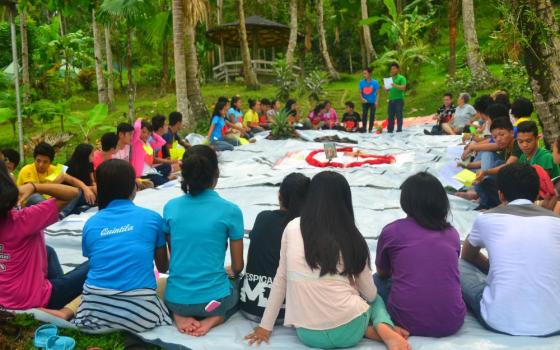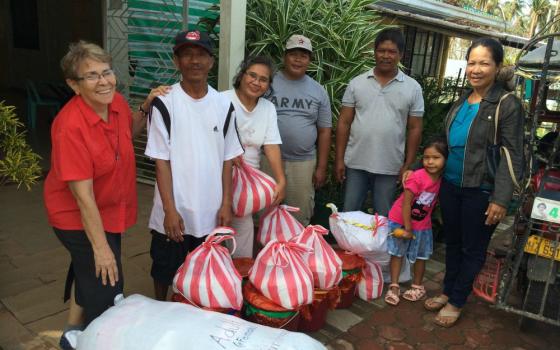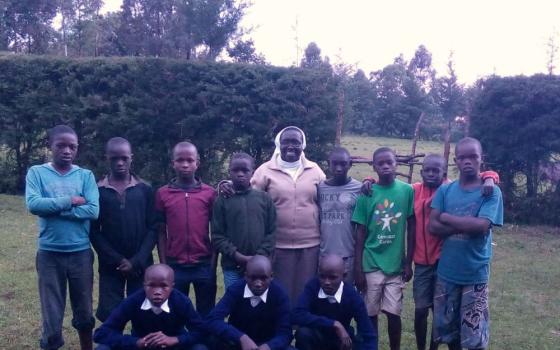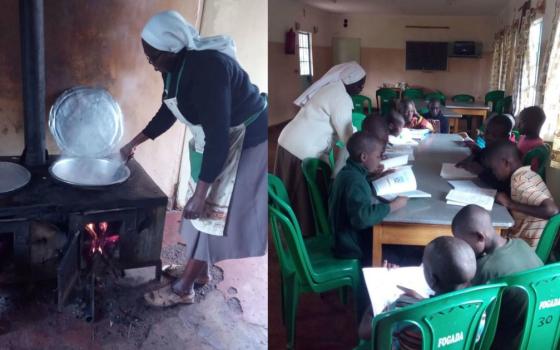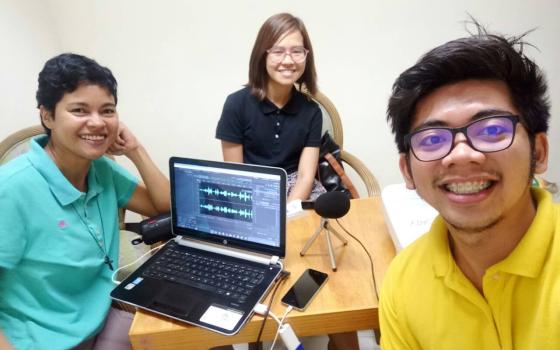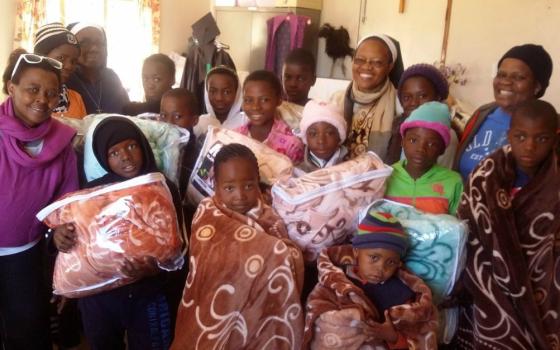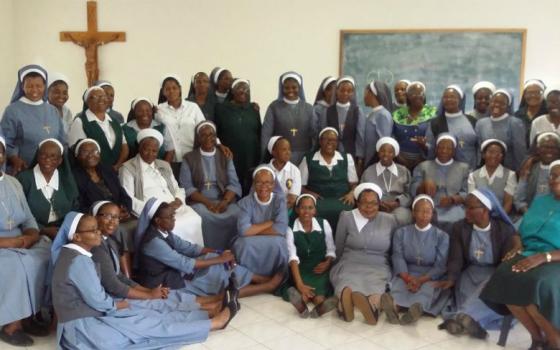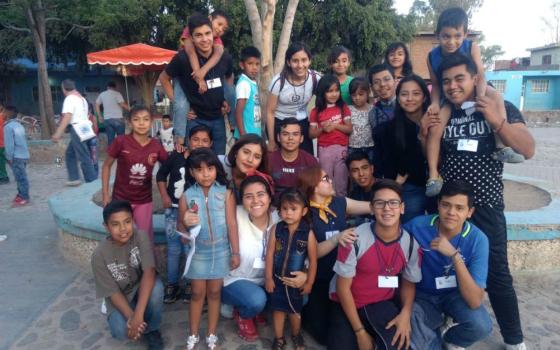For September, the panelists from congregations large and small described how their congregational charisms fit into the "great commission" of Jesus and gave examples of specific ways they carry it out. They also discussed how they have extended the call to discipleship to associates, volunteers, donors, students and co-workers in their responses to the following question:
"Go, therefore, and make disciples of all nations" (Matthew 28:19). In what ways have you and/or your congregation followed this command of Jesus?
______

Lydia Collado is a Religious of the Sacred Heart who ministers in Northern Samar, Philippines. She is the program director and head of the SHIFT Foundation, which does campus ministry, pastoral ministry, operates a nursery, and manages Sophie's Farm, an organic demonstration farm.
Our Society of the Sacred Heart has its inspiration to "make disciples of all nations" from our foundress, St. Madeleine Sophie Barat, who said, "I will go to the ends of the earth to gain one soul for God. I will stop at nothing," and from St. Rose Philippine Duchesne, our pioneer missionary to the Americas in 1818, who went beyond borders to the peripheries or margins of her time, where Pope Francis would call us to go today.
Our 2016 general chapter called us with the same vigor and passion: Set sail, live more humanly, create silence and act as one body.
In 1986, we "set sail" to a mission in Northern Samar, now the fifth-poorest province in the Philippines. It was like "going to the ends of the earth" and "to the margins." There, we created the Sacred Heart Institute for Transformative Education (SHIFT) Foundation, which coordinates our diverse ministries.
We live and work on a long- or short-term basis with volunteers and mission partners — young and old, local and international — learning, praying, recreating and celebrating.
To live and work with poor people demands a lot of time and energy. Discipleship needs prayer — individual and community — and silence and contemplation so we can listen to the Spirit.
"Living more humanly" is part of discipleship and implies dialogue and creation of loving and truthful relationships: becoming more human with one another. Spending quality time together gives us one mind and heart for the mission. By healing relationships, we become effective ministers.
In 2015, a strong typhoon flattened us to the ground. Our house, center and cottage roofs blew away, except a section where the children took cover. We organized ourselves afterward as a village community and tried to rise up together. As a local community belonging to a global community of the Society of the Sacred Heart, we "acted as one body" in our disaster response, drawing strength from the Heart of Jesus, whose love and life constantly flows out to care for us all, his disciples.

Henrietta Eziashi belongs to the Franciscan Sisters of Glasgow, Scotland. After ministering in teaching and educational administration, she served two terms as provincial superior in Nigeria, then was elected to the central leadership team of her congregation. Presently, she does pastoral work in Lagos, Nigeria, and does development work for her province.
Jesus Christ gave a parting mandate that would take his disciples all over the world and tells us consecrated women to walk closely with him as we continue his spiritual work of teaching and healing through love. Through the guidance of the Holy Spirit, the Franciscan Sisters of the Immaculate Conception continually open themselves to this call of God.
At first profession, we are commissioned through our superior to "live your life with courage … take to all the world a message of peace." Our first duty is to live the Gospel way of life, living an exemplary life that speaks louder than words.
Hospitality is a special hallmark of the service we offer. We respond to the needs of the local church, particularly its pastoral service to the poor, the needy, the vulnerable and marginalized.
In Kenya, we have a shelter at Motobo village called the Family of God Shelter for street boys, ages 8 to 17. We rescue boys, rehabilitate them at the shelter, and reunite them with their families after six months to one year in the shelter. These boys are placed in schools, and the sisters carry out home visitations to determine their progress in school and at home. Our society now realizes that street boys have potential.
We can fully express Christ when we are able to recognize him in others. No culture or religion is beyond the great commission. We may not minister in exactly the same way, but we spread the same message of love and hope.

Karlyn Cauley belongs to the Sisters of the Divine Savior (Salvatorians) in Milwaukee. A studio artist, she ministered in art education and with sisters in temporary vows in her congregation's formation program for many years. Presently, she does ecumenical work in the adult spirituality of women.
In high school, I supported the Mission Club (yes, we called it that) and wanted to become a missionary doctor. When I was a young sister, I hoped to become a missionary to Tanzania.
The community charism of the Sisters of the Divine Savior, "Go to all nations," motivated me, but advanced science courses were beyond my abilities. I graduated with a theology degree.
The Second Vatican Council created an environment for our congregation to wrestle with the meaning of "mission" at home and abroad and to rethink our founding charism.
We realized that "Go to all nations" must be mutually and inclusively sought: It meant the people we served were our salvation rather than those to whom we brought salvation! Our ministries were profoundly changed by collaborating with the hopes and goals of the people we served.
"Go to all nations" also asked us to be willing to listen to the larger congregational concerns. Our congregation's leaders in Rome encouraged participation in affirming multicultural diversity. And while the "all nations" that motivated us earlier often meant missionary work in faraway locations, now, as finances and members' energies are waning, we are using opportunities to be the bridge-builders for the future.
When our mission advancement department asks us to travel and speak for mission appeals in Catholic parishes, we tell our sisters' stories. The donations support the formation of new members and their collaborative ministries in our other units: Schools are built, immigrants are sheltered and educated, clinics for new mothers and infants and postnatal care are provided.
In the U.S., our growth in global awareness is fostered by our membership in the UNANIMA program at the United Nations and by our sister-interns there.
Now we are able to see ourselves as a single intercultural congregation rather than formerly separate units. We are members together in our inclusive mission and in our solidarity as a congregation.

Adriana Haro Betancourt belongs to the Verbum Dei Missionary Fraternity. She is from Mexico but currently works in youth ministry in the Philippines, where she heads her congregation's national communications team and produces a weekly online radio program for youth evangelization. She made final vows in 2014.
Verbum Dei, my congregation, is dedicated to forming disciples of Christ among people of every race, culture, social condition and state of life. We know we are successful when they come to know Jesus, follow him and make other disciples.
But this is much more than an institutional command for me. It is my passion, for it makes me share in God's very art — he, the Spirit of Love, is the only one who can reshape the human heart. It is also my joy, for I am convinced that when a person decides to follow Christ, something new and beautiful happens in the world.
When I try to answer this question, I see the faces and names of people I have accompanied as they followed the footsteps of Jesus, especially the youth: the young people with normal struggles and fears, talents and dreams who have connected with Jesus in prayer through his word.
Helping them hear his call to lend him their eyes, hands, feet and hearts; this has been my humble contribution in this work of the Spirit. What I have seen and heard in accompanying them — struggles, tears, joys and the choice of Christ and his values — are for me the best illustration of discipleship.
Of course, none of them knocked at my door asking to be formed as a disciple. It has entailed a lot of "going out" and entering into the unknown to find them where they are, to find their "nation." The world of youth has its own language and logic.
Its culture and values are sometimes hard to understand, but Jesus moves me to go out and try to enter into this fascinating world, physically and through online platforms. Seeing my joy at having him as center of my life has opened doors in the heart of the young people, letting the Spirit perform his art of forming a new disciple of Christ.

Lilian Bong is a Sister of St. Joseph of the Apparition in Western Australia. Born in Malaysia and trained as a nurse, she did medical mission outreach in Myanmar before making her final profession in 2016. Now she serves as second councilor to the provincial, does vocation and mission appeal work, and has a special ministry to elderly Chinese people.
"Go, therefore, and make disciples of all nations" sounds like a serious commandment and a big task for any Christian trying to live a life faithful to Jesus' way of life.
What does it mean for the Sisters of St. Joseph of the Apparition, represented by about 35 nationalities and present in about 27 countries, to go and make disciples of all nations?
Our charism simply invites each of us to meet "the nation" on a very ordinary daily basis, to incarnate God's tenderness, love, mercy and justice for all we meet. Our constitution clearly states that by the "works of charity" to which the sisters dedicate themselves, the congregation is, by vocation, a living sign today of the love of God, which has become incarnate and which reaches people through human actions. Wherever it is present, it witnesses to the infinite tenderness of God for humanity.
In July, our provincial chapter (Australia/Thailand) was held in Perth, Western Australia, on the theme: "Towards an Intercultural Mission."
A chapter calls consecrated women and men into deep reflection on our mission and life: how we respond to the signs of the times and the challenges that call us to witness to Christ in our mission.
Thanks to globalization and technology, the world is getting smaller, but no riches, knowledge, expertise or technology can satisfy the human heart. In whatever role we serve, we are called to incarnate God's love to all we meet.
I was reminded of this by one of the verses of the hymn "Now We Remain" by David Haas:
He chose to give of himself, became our bread.
Broken that we might live. Love beyond love, pain for our pain ...
We are in the presence of God. This is our call.
Our mission of making disciples of all nations continues. Our call — both as baptized Christians and as religious sisters — is to be the presence of God. As Pope Francis urged, to "allow the Spirit to forge in us the personal mystery that can reflect Jesus Christ in today's world."

Letta Mosue belongs to the Congregation of St. Brigid from the Rustenburg Diocese, South Africa. She has been an educator, clinical psychologist and specialist in trauma counseling and ministered in university and police correctional services. She now works in private practice and at an oncology clinic while serving as superior general of her congregation.
"Go, therefore, and make disciples of all nations."
This quotation introduces Chapter V on apostolic life in the Constitutions of the Sisters of St. Brigid, so it has formed an important part of how we see our mission.
The Congregation of the Sisters of St. Brigid is a diocesan congregation founded in 1958 by the late Archbishop John Garner and entrusted for training to the Sisters of Charity of St. Paul the Apostle, whose constitutions they followed until their autonomy. They were founded out of a concern that the apartheid government would forbid European teachers to teach in African schools.
Teaching and nursing became the main apostolate through which our community responded to this command of Jesus. Pastoral work was done on weekends, but as pastoral needs became more pressing, some sisters became full-time pastoral workers.
We have been called to read the signs of the time again as our members age and retire and the younger ones leave the congregation. Presently, we have 15 sisters, so with no teachers or nurses, we try to empower lay leaders through workshops and to plant the seed for vocations among young people.
Responding in new ways to the command of Jesus, we started a lay associate group, Friends of St. Brigid, who work with us to evangelize, promote vocations and provide material and spiritual support for our mission.
We have been collaborating with other congregations since 1978, when our congregation and two other diocesan congregations were brought together by our leaders. Since then, the three congregations — Companions of St. Angela in the Johannesburg Archdiocese, the St. Brigid Sisters in the Rustenburg Diocese, and the Calvary Sisters in the Gaborone Diocese in Botswana — have collaborated in vocation promotion and formation and by providing support groups for our superiors general and bursars. We call ourselves the ABCs!
We are few, sickly and aged, but we are still responding to the command of Jesus thanks to our efforts at collaboration and the support of ABC, Friends of St. Brigid, and benefactors!

Andrews Mary Robinson is a Franciscan Missionary of Mary sister. Indian by nationality, she has worked in Cuba, Mexico and Nicaragua, accompanying elderly women at an old-age home, doing pastoral work, ministering in villages by visiting families, preparing catechists, and working with women in income-generating activities. Now she lives in Leon, Mexico, studying educational administration.
"Everywhere we are missionaries just for our vocation, for the whole world is our homeland."
—Blessed Mary of the Passion, founder
The missionary mandate of Jesus Christ to "go into the entire world," which began the great expansion of the church, continues to be mandatory for us Franciscan Missionaries of Mary; indeed, we were founded exclusively for this universal mission, even if we proclaim Christ only by our presence.
Our congregation is now in 75 countries throughout the world, and now we are forming lay associates with the FMM spirituality to carry on the mission of Christ in their daily lives.
In our Tepeyac Institute in León Guanajuato, Mexico, even high school boys and girls show missionary zeal by going to the villages to proclaim Christ during Holy Week. This year, four groups of teachers, FMM sisters and students went to four different villages to stay for Holy Week and experience the people's way of living happily in poverty and simplicity.
In the villages, the people greeted us warmly. We visited families, listening to them and then inviting the children to play and learn their catechism, a very enriching experience for us.
I have had many missionary experiences but want to give an example of how students and teachers responded to this one:
José Oswaldo Barajas Calvillo, a teacher, expressed satisfaction in knowing that students "have learned to value what they have and give themselves to those in need. This is what Christ wants of us."
Luz Jaqueline Ponce Echeverria, a student, noted that her Holy Week experience "taught me to be conscious to value my family and what I have. My experience is a call to be a witness and motivate our companions to participate and to share with the needy without discrimination and make Christ known."
It is exciting for me to realize that our charism, passed on to us by Blessed Mary of the Passion, is still active and alive in proclaiming Christ to the needy around the world.
